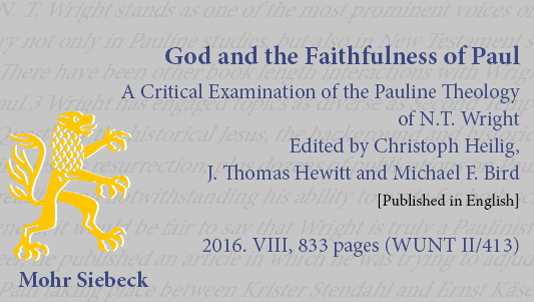N. T. Wright draws as much criticism as he does commendation. His prolific academic career has given plenty to interact with, and he’s recently added a capstone to his career by publishing his 1,700 page volume on Pauline theology, Paul and the Faithfulness of God. Many reviews appeared, some of article-length, and Wright even responded to these reviews in a short book, The Paul Debate. But such a monumental work of such weighty importance deserves a full, critical treatment.
Mohr Siebeck and editors Christoph Heilig, J. Thomas Hewitt, and Michael Bird have compiled the most comprehensive critique of N. T. Wright to date, specifically in response to Wright’s Paul and the Faithfulness of God. Cheekily titled God and the Faithfulness of Paul, this collective effort includes essays from over thirty scholars, including some Germans scholars to globalize the work.
In the area of Pauline theology, this is nearly a must-have. The last major Pauline theology to be published was James Dunn’s The Theology of Paul the Apostle in 1998. Thus, Wright’s Pauline theology is now the major source for conversation and target of criticism, and Wright’s stature ensures it will be a lasting monument to the field. So this new work from Mohr Siebeck, with its thorough and extensive interaction with the new Pauline blockbuster, is a most important book to own.
Here are some of the topics and arguments made throughout the volume:
- B. Schliesser situates Wright’s volume among other Pauline theologies
- A. Losch argues correctly that Wright’s construal of critical realism is not what he claims it is
- T. and C. Heilig commend Wright’s abductive historical reasoning but suggest ways to improve it
- S. Moyise suggests Wright pays too much attention to allusions and echoes in Paul because it enables him to connect Paul to the OT metanarrative more easily
- G. Sterling approves of Wright’s lengthy section describing Hellenistic philosophy, but suggests some elements he should have included
- S. Kim continues to remain unconvinced that Paul preached an counter-imperial message
- S. Grindheim argues that Wright’s view of election focuses too much on Israel’s vocation and not on God’s unconditional choice
- James Dunn laments that Wright swipes too broadly at him and Sanders, which perpetuataes tension within the New Perspective camp
- P. Stuhlmacher critique’s Wright’s construal of justification because he has too many exegetical hypotheses and speculations
- L. Hurtado argues Wright is wrong about the expectation of YHWH’s return to Zion (and the inference that Jesus is YHWH embodied) being the major catalyst for early high christology
- E. Schnabel interacts with Wright’s portrayal of Paul’s missionary methods and strategy
- In the final section, Wright responds to everyone in 55 pages
This is only a sampling of the engagement to be found in this volume. People will be talking about Paul and the Faithfulness of God for decades to come, and this new book from Mohr Siebeck is a sure guide to the most contentious issues in Wright’s account of Paul’s theology.
I highly recommend it to any students of Pauline theology and even to pastors who want to engage in rigorous Pauline debates. For Pauline scholars, it would be irresponsible not to own this volume!
Preview or buy it here



2 comments